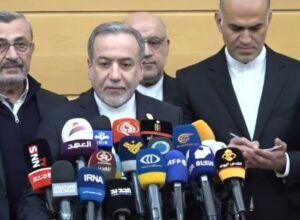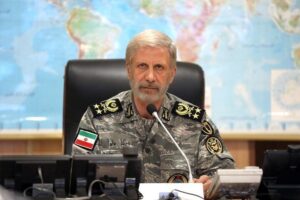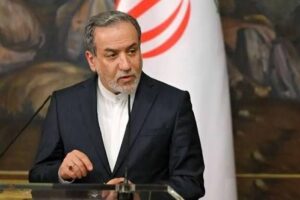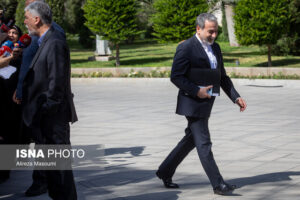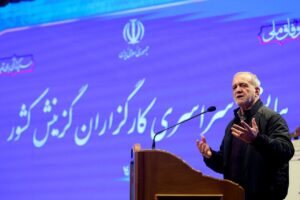The action of the European Troika (the United Kingdom, France, and Germany) to activate the snapback mechanism for the automatic return of sanctions will inflict irreparable damage on Europe’s international standing and credibility. This mechanism was designed as a penalty for non-implementation of key commitments under the 2015 nuclear agreement, signed by Iran, the three European countries, the United States, China, and Russia.
As was emphasized in the joint letter of Iran, China, and Russia, the European Troika’s move to activate the snapback mechanism lacks any legal or juridical basis and is politically destructive. Countries that fail to honor their commitments have no right to benefit from an agreement they themselves have undermined. No action can negate the chain of events that led Iran to adopt legal remedial measures under the nuclear deal.
It was the United States—not Iran—that in 2018 violated Resolution 2231 by unilaterally halting its participation in the Joint Comprehensive Plan of Action (JCPOA). This destructive move was compounded by the European Troika’s failure to uphold their commitments under the JCPOA and their alignment with America’s unlawful sanctions. Now these three countries, under the pretext of rejecting negotiations by Iran, are seeking the reinstatement of UN sanctions—countries that, by supporting the United States’ unlawful military strikes in June 2025 against the peaceful nuclear facilities of the Islamic Republic of Iran, facilities protected under international law, have further highlighted their role in enabling Washington’s excesses. These strikes took place on the eve of the sixth round of indirect negotiations between Iran and the U.S.
By embarking on this course, the European Troika has subjected Europe’s credibility and international standing to numerous negative consequences. In this game, the three European countries will not only fail to prevail but will also be excluded from future diplomatic processes. If this narrow window of opportunity to change course is missed, severe and widespread repercussions will ensue for West Asia and the international system—consequences that will undermine the integrity and credibility of international agreements and shake the very foundations of collective security.
The Islamic Republic of Iran has consistently, with utmost restraint, demonstrated its steadfast commitment to resolving issues related to its peaceful nuclear activities through diplomacy and negotiation, and to achieving a fair and new agreement. Such an agreement must, while respecting national sovereignty and the rights of the Iranian people under the Non-Proliferation Treaty, address all mutual concerns, including the unjust sanctions that have targeted the livelihood and well-being of the Iranian nation.
Iran, despite being subjected to the unlawful and criminal attacks of the Zionist regime and the United States, has remained steadfast in exercising its inalienable rights to the peaceful use of nuclear energy under the Nuclear Non-Proliferation Treaty (NPT), while also declaring its readiness to engage in constructive and meaningful dialogue on this matter.
On September 9, 2025, the Islamic Republic of Iran signed a new agreement with the International Atomic Energy Agency (IAEA), mediated through Egypt’s diplomatic efforts. This agreement marks another chapter in Iran’s diplomatic endeavors to resolve issues related to its peaceful nuclear activities. The agreement, while respecting national sovereignty and guaranteeing Iran’s legitimate rights, ensures continued cooperation with the IAEA under a mutually agreed framework.
Iran will never compromise on its sovereign rights or its security. Accordingly, this agreement will be implemented in line with the “Law on Obligating the Government to Suspend Cooperation with the IAEA,” passed by the Islamic Consultative Assembly and under the framework of Iran’s Supreme National Security Council. Its validity will remain intact only so long as no hostile actions are taken against Iran, including the reinstatement of UN Security Council resolutions that were previously lifted; otherwise, the Islamic Republic of Iran will consider its commitments terminated.
It should be noted that the “Law on Obligating the Government to Suspend Cooperation with the IAEA” was passed on June 25, 2025, by the Islamic Consultative Assembly, approved by the Guardian Council, and subsequently enacted by Masoud Pezeshkian, President of the Islamic Republic of Iran. The law was adopted in response to U.S. and Israeli attacks on Iran’s peaceful nuclear facilities and aimed at protecting the country’s national interests and securing its nuclear infrastructure.
In conclusion, while expressing gratitude for the resilience and steadfastness of the government and people of Indonesia in supporting the oppressed people of Palestine and in their firm and swift condemnation of the Zionist regime’s aggression against the Islamic Republic of Iran and other regional countries, I once again emphasize the necessity of unity among Islamic nations in their comprehensive struggle against Israel, in confronting international double standards, and in reforming the flawed structures of multilateral institutions.
The passivity of international multilateral bodies in the face of repeated and flagrant violations of international law by the Zionist regime has eroded the credibility of the very foundations of international legal norms and has enabled the expansion of this regime’s crimes across West Asia. The Zionist regime’s recent attacks on five Arab countries—Palestine, Lebanon, Syria, Qatar, and Yemen—once again exposed its savage and aggressive nature in pursuit of its longstanding dream: the annexation of all territories between the Nile and the Euphrates. This vision, officially and publicly articulated by Benjamin Netanyahu, the greatest war criminal of the century, under the “Greater Israel” plan, poses a serious threat to the sovereignty of other Islamic countries in the West Asia region.

